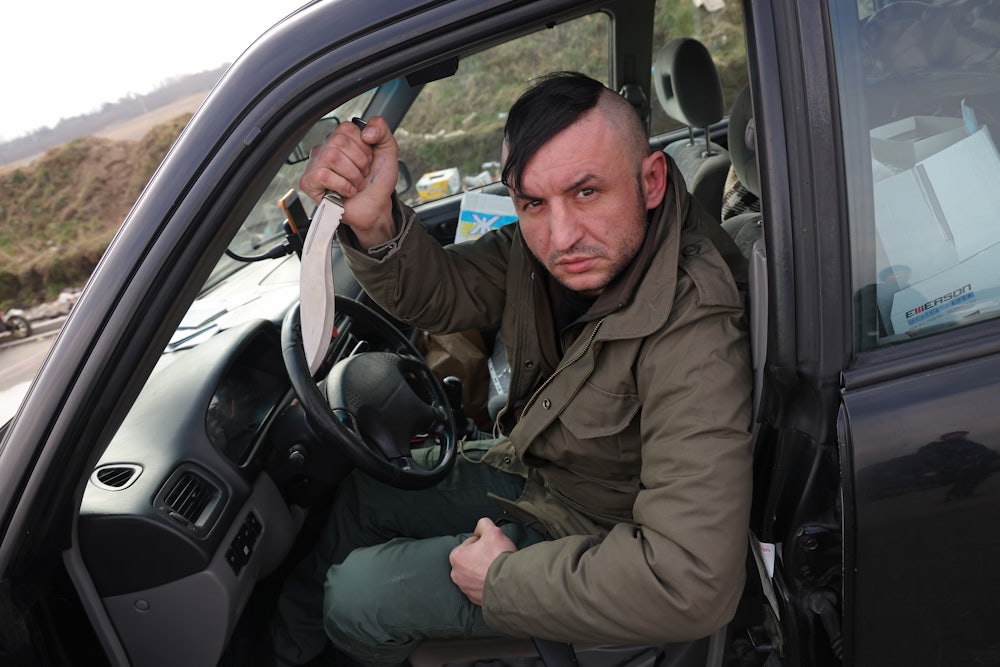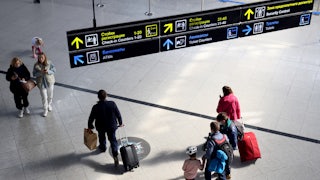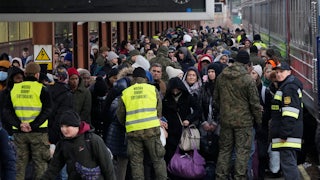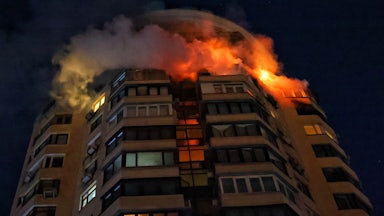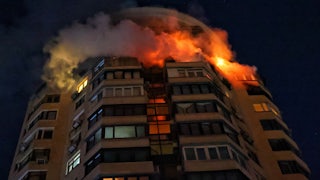Seventy-year-old Vladimir Georgivich arrived in Poland from southern Ukraine and decided to return the same day. “It’s cold here,” he said, walking with a cane and carrying two suitcases. “Nowhere is safe from Putin and those bastards.”
He was one of about 200 people waiting in line outside the drab railway customs building in the Polish town of Przemysl, located about eight miles from Ukraine, for a train to Lviv, the largest city in Western Ukraine.
While the United Nations says the exodus since Russia invaded Ukraine on February 24 is the largest of this century, there has also been a sizable influx. While the U.N. estimates that over 1.3 million people have fled Ukraine (mostly women and children, as men age 18 to 60 are barred from leaving the country), Ukrainian Defense Minister Oleksii Reznikov said on March 5 that more than 66,000 men had come back to fight.
Here in Przemysl, there are no tickets and no fares for these old Soviet-era trains to Lviv. There is a schedule scrawled on a piece of paper in Sharpie taped next to the door of the customs building, but it’s mostly aspirational—trains arrive when they arrive and depart when they depart. The journey is said to take around three hours to go 60 miles, which is fast compared to the trains that travel in the other direction, which volunteers say take at least 18 hours and as many as 28.
The line for the train to Lviv had a mix of men and women and included people of all ages, although there were few small children. Hundreds in this line were returning to be with their families and their pets—or to say goodbye to their relatives going off to fight. They were going back to fight, or to volunteer for the war effort, or just to go back to work.
Many in line waiting had been there for around two hours as light snow fell and temperatures hovered around freezing. Despite the delays, the mood was defiant. While some said they were going to pick up children and return to safety in Poland, many others said that they were going to stay in Ukraine. Many passengers had found themselves abroad on vacation or working when Russia invaded. (Ukraine has had visa-free travel with the European Union since 2016.)
Yaroslava Pylypenko, 25, a lecturer in the central Ukrainian city of Vinnitsa, was at a conference in Greece when Russia launched its war. She was going back to be with her students, whom she didn’t want to lecture on Zoom. “Vinnitsa is quiet and peaceful,” she said, emphasizing that there was no fighting there.
Olya, 25, and Michael, 27, who, like several going off to volunteer or fight, declined to give a last name, had been on vacation in Austria. “Our parents told us not to go, but we had to go back to Ukraine to help,” she said. They were headed for the Western city of Ternopil to reunite with their son. They weren’t exactly sure how they would help the massive volunteer effort, but they were bringing back a bag full of power banks that charge cell phones. “We like to travel, but we are very proud of our country—there is only Ukraine,” Olya said.
Slava, 37, was working on a merchant ship in the Mediterranean Sea off the coast of Italy when Russia invaded Ukraine. Having served in the Ukrainian military, he was eager to join the territorial defense or rejoin the armed forces. He had traveled through four countries to get to Przemysl. The decision to return was “easy,” he said. “I felt calmer as I got closer to the border,” he said. “This is a moment of truth.”
Despite the fact that several passengers said they felt better being closer to home, returning home was not an option for some. Olga, who said she was “over 60,” was on vacation in Istanbul when Putin started the war. She could not go back to the Donetsk Oblast, where she had lived on the side controlled by the Ukrainian government near the breakaway Kremlin-controlled Donetsk People’s Republic. She was meeting her family who had fled to Lviv, which has already received 63,000 internally displaced persons and will likely get tens of thousands more in the coming days. She began to cry as she said, “Russia is wrong. We don’t want to be Russian. We are for Ukraine.”
About two hours after the train was scheduled to depart, the border guards started letting people into the customs building where they would have their documents processed before boarding. People rushed in. “TRAIN TO LVIV! TRAIN TO LVIV LEAVING IN FIVE MINUTES!” shouted a volunteer. Straggling passengers jogged to the entrance with rolled suitcases, as if it were the last Metro-North train leaving Grand Central for Connecticut.
The train left at 3:23 p.m. bound for Lviv, a little less than three hours late. Already, a new line began to form in the snowy cold.
